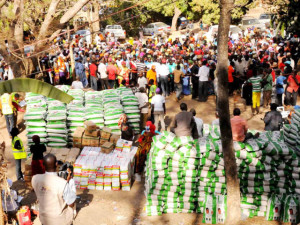Maiduguri — Over 15,000 people have been killed and 2 million displaced in Nigeria, Chad, Niger and Cameroon
With more than one million people living in camps around Nigeria’s northeastern city of Maiduguri, having fled their homes due to Boko Haram attacks, some are finding innovative ways to rebuild businesses from scratch.
Many of the displaced arrived at the camps with no money or possessions, leaving them totally dependent on the government and humanitarian organisations for their day-to-day survival.
Despite the harsh conditions of the camps, which host up to 30,000 residents, entrepreneurial spirit is not in short supply.
Several of those uprooted by the Islamist militant group, such as shopkeeper Modu Mustafa, have launched profit-making businesses within internally displaced persons (IDP) camps.
Mustafa saw his opportunity when the former governor of Borno state visited the camp where he resides in Maiduguri, home to 4,000 people, and gave the families there bags of rice.
Rather than eat the rice with his two wives and 10 children, 45-year-old Mustafa decided to sell it for 8,000 naira ($40) and used the money to open a kiosk in his family’s tent – selling items ranging from biscuits and batteries to salt and sugar.
“In one month, I make about 20,000 naira ($100) and use the money to feed my family,” he said, adding that the food provided by the state and aid agencies was not sufficient for his family.
Maiduguri has been inundated in the past three years by people fleeing Boko Haram, sending the city’s population surging to two million from some 600,000 and putting pressure on housing, health, food, and water supplies, aid agencies say.
More than 15,000 people have been killed and 2 million displaced in Nigeria and neighbouring Chad, Niger and Cameroon during the militant group’s seven-year insurgency to carve out an Islamist caliphate.
While nine in 10 of the displaced who arrive in Maiduguri find accommodation with host families, the rest reside in the city’s 22 government camps, or live in informal, makeshift settlements dotted outside of the capital of Borno state.
FEMALE ENTREPRENEURS
Fanne Saidu, a widow in her seventies, earned a living from selling locally-made pots and pans which helped her send her eight children to Islamic school, until the threat of Boko Haram forced her to flee to a camp in a primary school in Maiduguri.
She begged people for money and raised enough to buy dried plant flowers, which she mixed with water from a solar-powered tap in the camp to make a popular Nigerian drink called zobo.
Five months later, she is still in business, buying empty bottles from local children for 5 naira and filling them with the drink to sell at 10 naira (5 cents) each – and has even saved enough to rent a room at 1,500 naira ($7.50) a month.
“I make about 600 naira ($3) daily,” said Saidu, who earns more during term time when students buy zobo en route to school, or during their breaks. “I have never been idle in my life.”
Many government IDP camps in Maiduguri were previously established in schools, which remained shut for almost two years due to the widespread violence caused by Boko Haram.
The militants have destroyed nearly 1,000 schools in northeast Nigeria, and in their most high-profile attack, seized more than 200 girls from their school in Chibok in April 2014 .
While the government began relocating the displaced from schools in February in preparation for their reopening, many, like Husseina Abdullahi, were unhappy to have been moved.
“The environment there was better,” said the 35-year-old widow and mother of eight, adding that aid agencies had fitted the school with toilets and running water.
Although Abdullahi was first disappointed with her new home in the Bakassi camp, which she described as just a vast piece of land, she soon discovered she could turn her hand to farming.
She began sewing and selling traditional caps, and used the profit to buy seeds and farming tools which enabled her to grow vegetables such as spinach behind her tent.
“With what I plant, I can feed my children,” Abdullahi said.
POWER FOR FOOD
Many people in the IDP camps complain that conditions are poor, and the United Nations say many of the makeshift shelters are overcrowded and substandard in terms of water and sanitation facilities, cooking and privacy, especially for women.
Sites tend to be unfinished structures, with limited access to clean water, sanitation, waste management and electricity.
Usman Muhammed and Babagana Alhaji-Grema saw a business opportunity given the poor electricity supply in their camp.
The cousins, aged 29 and 22, fled their home in Bama two years ago, where they had sold over-the-counter medication.
But, they soon became bored with the daily routine of life in the camp. “We had nothing to do,” said Alhaji-Grema.
When his older brother came to visit from Lagos, Nigeria’s commercial capital, and gave them 30,000 naira ($150), they invested it in a phone charging business – to enable people to charge their phones when the electricity supply was out.
“An electrician from our village who is also here in the camp built it for us,” said Alhaji-Grema, explaining how they had bought a small generator, a variety of phone chargers, adapters and wood from a local market nearby.
It costs 30 naira (15 cents) to fully charge a phone, and their device is equipped with about 30 adapters, Alhaji-Grema added.
“We make at least 700 naira ($3.50) to 1,000 naira ($5) per day,” he said, out of which they buy enough fuel for the following day’s work, save some, then spend the extra on food.
“In the camp, the food is just manageable … if you go outside, you can buy better food.” ($1 = 199.0000 naira)

